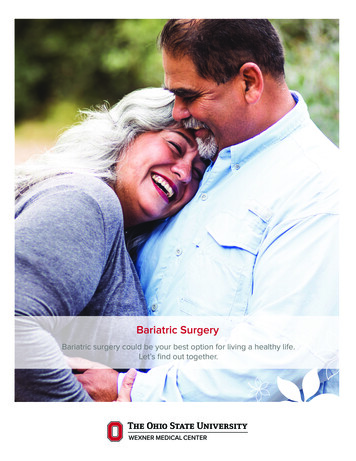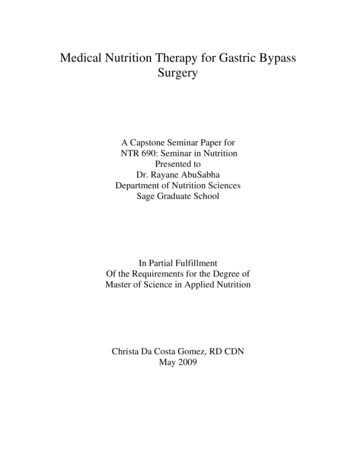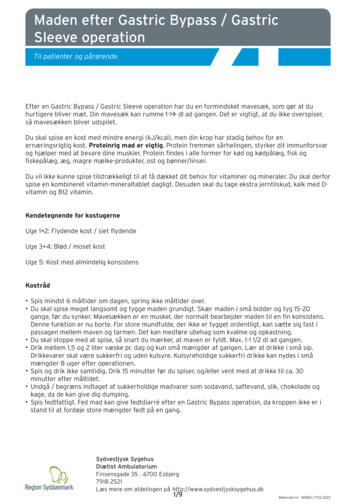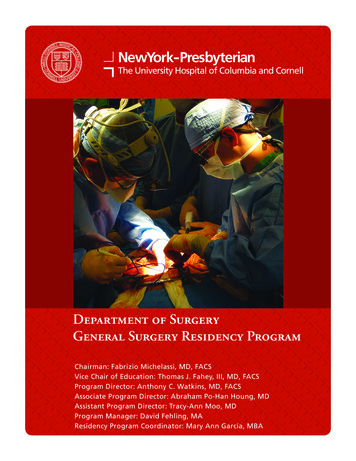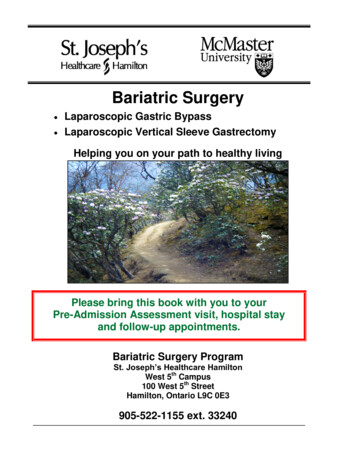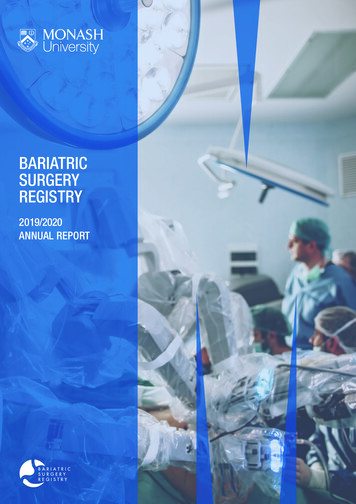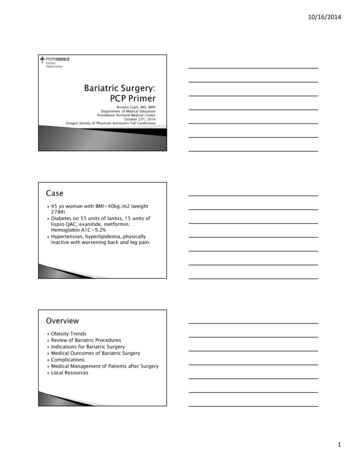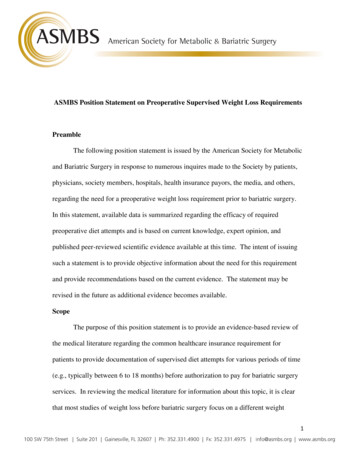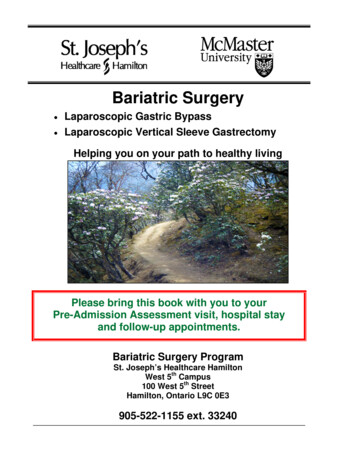
Transcription
Bariatric Surgery – Gastric Bypass and Vertical Sleeve GastrectomyBariatric Surgery Laparoscopic Gastric BypassLaparoscopic Vertical Sleeve GastrectomyHelping you on your path to healthy livingPlease bring this book with you to yourPre-Admission Assessment visit, hospital stayand follow-up appointments.Bariatric Surgery ProgramSt. Joseph’s Healthcare HamiltonWest 5th Campus100 West 5th StreetHamilton, Ontario L9C 0E3905-522-1155 ext. 33240
Bariatric Surgery – Gastric Bypass and Vertical Sleeve GastrectomyPlease bring this book with you to yourPre-Admission Assessment visit, hospital stayand follow-up appointments.The Ontario Bariatric Network is an Ontario Ministry of Healthand Long-Term Care project featuring regional bariatricprograms, general information and education.For more information go to: www.ontariobariatricnetwork.caOther websites to investigate include: www.webmd.com www.obesityhelp.com www.obesitynetwork.ca/publicThe information in this book is to be used for informational purposes only and is not intended asa substitute for professional medical advice, diagnosis or treatment. Please consult your healthcare provider for advice about a specific medical condition. A single copy of this book may bereprinted for non-commercial personal use only.Products mentioned in this book are used as examples only. Alternatives to these productsmay be used instead of the mentioned products with the advice of a health care professionaland your bariatric health care team.Picture on page 4 used with permission from University Health Network (Toronto Ontario,Canada).Cover photograph used with permission by Kerri Salata (Climbing to Mount Everest BaseCamp)Developed by the Department of Nursing Practice and Education,and Center of Excellence Bariatric Surgery Program,St. Joseph’s Healthcare Hamilton 2007 – 2016PD 6000 (Rev 2016) File: mdunn
Bariatric Surgery – Gastric Bypass and Vertical Sleeve GastrectomyInside this bookPageWhere to Go for Appointments and MoreiHealth Care Team ListiiAppointmentsiiiIntroduction, Health Care Team, Research1What is Obesity2Learning the Words and Pictures3What happens with Gastric Bypass Surgery?6What happens with Vertical Sleeve Gastrectomy Surgery?8What to Expect after Surgery10Mental Health and Well Being12Getting Ready for Surgery15 6 Months Before Surgery15 2 Months Before Surgery16 1 Month Before Surgery – Taking OPTIFAST19 If You Have Diabetes and Taking OPTIFAST21 OPTIFAST recipes23 1 to 2 Weeks Before Surgery25 2 Days (48 hours) Before Surgery26 1 Day (24 hours) Before Surgery26 After Midnight Before Surgery26 The Day of Surgery27 The Operation28 The Post Anesthetic Care Unit and Nursing Unit28At Home After Surgery30Getting Support from Family and Friends – Table of Contents35Understanding Change40Nutrition and Diet After Surgery - Table of Contents43Diabetes and/or Low Blood Sugar – After Surgery91Records and Logs - Table of Contents95Book Resources109
Bariatric Surgery – Gastric Bypass and Vertical Sleeve GastrectomyPage – 1
Bariatric Surgery – Gastric Bypass and Vertical Sleeve GastrectomyWhere to Go for Appointments and MorePlaceLocationTelephone905-522-1155Bariatric Surgery ClinicWest 5th CampusExt. 33240Level 0, Block CDiabetes ClinicWest 5th CampusExt. 32045Level 0, Block COutpatient PharmacyLevel 1 – Mary Grace WingCharlton Campus905-521-6170Pre-Admission AssessmentUnit (PAAU)West 5th CampusExt. 33830Level 0, Block CDay Surgery Unit (DSU)Level 2 – Surgical WingExt. 33835Charlton CampusOperating Rooms and PostAnesthetic Recovery Unit(PACU)Level 1 – Surgical WingGeneral Surgery andGastrointestinal (GI)Inpatient UnitLevel 6 – Mary GraceCharlton CampusCharlton CampusWest 5th Campus Address: 100 West 5th Street Hamilton, Ontario L9C 0E3Charlton Campus Address: 50 Charlton Avenue East Hamilton, ON L8N 4A6Pagei –2Ext. 33613
Bariatric Surgery – Gastric Bypass and Vertical Sleeve GastrectomyHealth Care Team MembersSurgeon / ResidentMedical InternistClinic NurseClinic NurseDietitianDietitianSocial WorkerDiabetes NurseCommunity Care Access Centre(CCAC) mboembolism Nurse / DoctorPhysiotherapistOccupational TherapistSleep Apnea DoctorOther:Other:Other:Pageii– 3
Bariatric Surgery – Gastric Bypass and Vertical Sleeve GastrectomyAppointmentsBefore Surgery Appointments:AppointmentDateTimeLocationAfter Surgery Follow-up Appointments:1 weekBariatric Clinic4 to 6 weekBariatric Clinic3 monthBariatric Clinic6 monthBariatric Clinic1 yearBariatric ClinicPage – 4iii
Bariatric Surgery – Gastric Bypass and Vertical Sleeve GastrectomyAn Important Message For unplanned reasons, your surgery may becancelled at any time. This may happen before your surgery date or onthe day of your surgery when you come to thehospital. If your surgery is cancelled you will be called athome and given another date for surgery. Please do not go to the Bariatric Clinic to make anew date.Page – 5
Bariatric Surgery – Gastric Bypass and Vertical Sleeve GastrectomyIntroductionYou have decided to have bariatric surgery. This book provides information that will helpyou prepare for this surgery and your new life after surgery.You, your family, friends and supports can refer to this book and may need to read theinformation many times.Please bring this book with you to all of your appointments before and after surgery and tothe hospital when you have surgery.Health Care TeamYou will work closely with your health care team. We are here to support and guide youbefore, during and after surgery.There is a list of your health care team members’ roles at the front of this book. Fill in theirnames as you meet the members of your team.Research at St. Joseph’s Healthcare HamiltonSt. Joseph’s Healthcare Hamilton is a research hospital. Research helps to improve thetreatments that we provide, leading to better care for patients. You may be asked to takepart in a research study.If you are interested in taking part in a study, be sure you understand the details of thestudy and how you would be involved before you sign a consent form.If you do not want to be in a research study, your care will not be affected.Teaching at St. Joseph’s Healthcare HamiltonSt. Joseph’s Healthcare Hamilton is a teaching hospital. This means that you may havestudents involved in your care. We welcome students from all health care professions.Page – 1
Bariatric Surgery – Gastric Bypass and Vertical Sleeve GastrectomyWhat is ObesityWhat does bariatric mean?Bariatric is the medical word used to describe the treatment and management of weight.Bariatric programs help patients improve their health and well-being by treating andmanaging weight.What causes obesity?Obesity is a chronic condition that needs to be managed for the rest of your life. You haveprobably done some reading and research of your own by now and know that there is justnot one cause. Research has shown that there are many reasons for obesity such as: genetic physiological metabolic hormonal psychological behavioural sociocultural environmentalOnce you have obesity, there is no cure for it and you will need to manage this conditionfor the rest of your life.Why can obesity be harmful to health?This is not an easy question to answer. Research has shown that there are many healthproblems that can result from obesity such as: hypertension heart disease gastro-esophageal reflux disease depression and/or anxiety respiratory disorders liver and kidney disorders high cholesterol sleep apnea type 2 diabetes infertility joint pain and/or osteoarthritis and/or gout certain cancersPage – 2
Bariatric Surgery – Gastric Bypass and Vertical Sleeve GastrectomyLearning the Words and PicturesHere are some words and pictures to help you understand gastric bypassand vertical sleeve gastrectomy surgery:Esophagus:(food tube)The esophagus is the tube that carries the food you eat and drinkfrom your mouth to your stomach.Gallbladder:The gallbladder stores bile produced by the liver. Bile is a digestiveliquid needed to help break down food you eat and drink. Bile helpsdigestion by breaking down fat for example. The gallbladderreleases bile when the food leaves the stomach and enters the smallbowel.Pancreas:The pancreas produces digestive liquids and enzymes that help indigestion. It also produces the hormone insulin to regulate theamount of glucose (sugar) in the body.Stomach:The stomach breaks food into small pieces so your body can use itfor energy.Small bowel:The food moves from the stomach to the small bowel first. The foodis broken into very small pieces and is absorbed into the blood asthe muscles push it along. The small bowel is also called the smallintestine. The small bowel or intestine has 3 sections called theduodenum, jejunum and ileum.(small intestine)The 2 sections of the small bowel involved in this surgery are calledthe duodenum and jejunum. They are shown in the picture on page 5.Large bowel:(large intestineor colon)The large bowel is the last part of the digestive system. Water isabsorbed here and the remaining waste material is stored until youhave a bowel movement. The large bowel is also called the largeintestine or colon.Page – 3
Bariatric Surgery – Gastric Bypass and Vertical Sleeve GastrectomyA look inside before surgery:EsophagusStomachGallbladderPancreasSmall bowelLarge bowelPage – 4
Bariatric Surgery – Gastric Bypass and Vertical Sleeve GastrectomyArrows show the direction foodmoves through the body ( )Esophagus or food tubeStomachDuodenumJejunumPage – 5
Bariatric Surgery – Gastric Bypass and Vertical Sleeve GastrectomyWhat happens with Gastric Bypass Surgery?During this surgery, your surgeon makes a small stomach pouch at the end of theesophagus. The pouch is made by stapling the top part of the stomach. The larger part ofthe stomach is stapled closed. The small intestine is cut at the jejunum and attached to thestomach pouch.As you can see in the picture, most of the stomach is bypassed and not used any more.The duodenum is also bypassed. The larger stomach is still left in place and the normaldigestive juices from the stomach and duodenum help digest food when rejoined lowerdown on the small bowel. The food you eat and drink will now go into the new, smallerstomach pouch and then to the jejunum.The new, smaller stomach limits the amount of food you can eat since it holds less food.You also feel less hungry as you do not have as many hunger hormones. You feel moresatisfied eating less food.Bypassing the duodenum means your body absorbs less nutrients including vitamins andminerals. Bypassing part of the small intestine also means that some hormones whichaffect metabolism are also changed.At first, the pouch holds about 30 ml (¼ cup or 2 ounces). Normally a stomach holdsbetween 1000 and 1500 ml (35 to 50 ounces or 4 to 6 cups). Over time the pouch can holdabout 240 ml (8 ounces or 1 cup).Since the amount you can eat is less, it is important to make healthy food choices forweight management and overall health.Before SurgeryAfter SurgeryStaplesArrows show food moving through body before and after surgery.Page – 6
Bariatric Surgery – Gastric Bypass and Vertical Sleeve GastrectomyA Closer Look at Gastric Bypass SurgeryStaplesSmall stomach pouch is madeSmall stomach pouchis attached to thejejunumRest of the stomachis closed off but notremovedThis surgery is done using 5 to 6 small incisions. Each incision is 5 to 12 millimetres (mm)long. One incision is used to insert a small camera so the doctor can see. The other incisionsare used for instruments needed to do the surgery. The incisions are closed with dissolvablestitches and special tape on top called steri-strips.Here is a picture of where theincisions may be. Your incisions maynot be in exactly the same places.IncisionsBelly button (umbilicus)Page – 7
Bariatric Surgery – Gastric Bypass and Vertical Sleeve GastrectomyWhat happens with Vertical Sleeve Gastrectomy Surgery?Vertical sleeve gastrectomy (VSG) is a restrictive, laparoscopic surgery. During thissurgery most of the stomach is removed. Since the stomach is smaller, you feel full sooner.The smaller stomach limits the amount of food you can eat since it holds less food.You also feel less hungry as you do not have as many hunger hormones. You feel moresatisfied eating less food.The stomach is cut creating a long pouch that connects the esophagus to the smallintestine. The pouch or ‘sleeve’ is stapled and the rest of the stomach is removed.StaplesEsophagus (food tube)The part of stomachthat stays is shapedlike a sleeveThis part of stomachis removedSmall intestines donot changeArrows show food moving through body after surgery.At first, the pouch holds about 100 ml to 120 ml (3 to 4 ounces or ½ cup). This depends onthe surgeon doing the surgery. Normally a stomach holds between 1000 and 1500 ml (35 to50 ounces or 4 to 6 cups). As shown in the picture, the way the food leaves the stomachdoes not change. The nerves are also left intact. Therefore the stomach is smaller but thefunction stays almost the same. Over time the pouch can hold about 240 ml (8 ounces or1 cup).None of the intestines are bypassed so food leaves the stomach and moves through theintestines normally. The smaller stomach continues to function normally.Since the amount you can eat is less, it is important to make healthy food choices forweight management and overall health.Vertical sleeve gastrectomy cannot be reversed.Page – 8
Bariatric Surgery – Gastric Bypass and Vertical Sleeve GastrectomyVSG surgery may be done for people who: have medical problems such as anemia, stomach ulcers and inflammatory boweldisease that would place them at high risk for surgery involving intestinal bypass have other conditions such as previous multiple abdominal surgery that would placethem at high risk for surgery involving intestinal bypass are booked to have gastric bypass surgery but when doing the surgery the surgeondecides gastric sleeve is a safer option at this time have a lot of weight to lose and the surgeon decides that VSG is the first step possiblyfollowed by another form of weight loss surgery when it is safe to do so.VSG surgery is done using 5 to 6 small incisions. Each incision is 5 to 12 millimetres (mm)long. One incision is used to insert a small camera so the doctor can see. The otherincisions are used for instruments needed to do the surgery. The incisions are closed withdissolvable stitches and special tape on top called steri-strips.Here is a picture of where theincisions may be. Your incisionsmay not be in exactly the sameplaces.IncisionsBelly button (umbilicus)Page – 9
Bariatric Surgery – Gastric Bypass and Vertical Sleeve GastrectomyWhat to Expect After SurgeryYou and only youSince each person is different your journey will not be the same as anyone else.Try to avoid comparing yourself to others in the program.After surgery, some people lose more weight and some people lose less weight; somepeople lose weight quickly while others lose weight slower but still lose weight.Always keep in mind that you and your body need to do this in your own time. Rememberthat the real benefit of surgery is not necessarily how much weight you will lose, but theability to keep most of it off in the long-term.Most people lose between 20% and 30% of their total body weight within the first 2 yearsafter surgery. However, the majority of your weight loss will happen in the first 6 to12 months. For example, a person starting at 300 pounds (136 kg) before surgery willtypically lose 60 to 90 pounds (27 to 40 kg).The focus in the bariatric program is to support you in following a healthy lifestyle and notset goal weights.After 1 or 2 yearsAfter the first or second year when your weight loss has slowed or stopped, you willtypically gain some weight back slowly over time. People often regain 5 to 10% of theweight they lost within 5 years. This is normal and does not mean that you are doinganything wrong. Some people regain more than 10%.It is important to remember that weight regain is complicated and not completelyunderstood. It is very important that you contact the clinic if you are concerned aboutweight regain down the road.Your best weightYour best weight is the weight you can maintain while still eating and living in a way thatyou can enjoy and sustain. Your best weight may never be the ideal weight that you want.This is very important to keep in mind.Remember that as little as 5% to 10% weight loss has been shown to improve weightrelated illnesses such as the problems shown on page 2.Your lifestyle planAs part of your lifestyle plan, you will need to follow a healthy diet and stay active.If you do not maintain a healthy lifestyle, you will gain weight back and experience arelapse in your obesity related health problems.The graph on the next page was created by Dr. Arya Sharma, a Canadian weight lossexpert. The graph shows what generally happens after surgery.Page – 10
Bariatric Surgery – Gastric Bypass and Vertical Sleeve GastrectomySource: www.drsharma.caThe dark line shows what can happenif you eat healthy and exercise regularly.The lighter line shows what will happen topeople who stop treatment.Remember:To keep weight off in the long term, you must always continue with the healthy behavioursyou have established. If you stop treatment, you will regain weight.Stopping treatment can mean many things: not following a healthy diet not exercising regularly not attending your follow-up appointments not attending to your physical and/or mental health needsPage – 11
Bariatric Surgery – Gastric Bypass and Vertical Sleeve GastrectomyYour Mental Health and Well BeingWhen you are thinking about having bariatric surgery our team meets with you to talk aboutyour history of physical, emotional and mental health problems. We collect this type ofinformation so we can make a plan for your care before and after surgery. Our goal is to helpyou prepare physically and emotionally for surgery and the changes that occur after.A reality for many people who struggle with weight issues is that they may have: problem eating behaviours such as not consistently eating meals and/or binge eating concerns with body image mood disorders such as depression or bipolar disorder anxiety disorders post-traumatic stress disorder substance use problems with alcohol, tobacco and/or recreational drugsHaving a history of these problems will not prevent you from havingbariatric surgery. It just means that we will need to work together todevelop a plan of care that ensures that bariatric surgery is both safeand successful. Your team of bariatric professionals is here to help.Problem Eating BehavioursBinge eating is one of the most common eating behaviour problems. Binge eating involveseating large amounts of food in short periods of time. When a person binge eats, he or shefeels a loss of control over eating such as being unable to resist or stop eating certain foods.A person who binge eats often feels guilt, anger and shame. He or she may also havephysical problems such as pain or discomfort from overeating.Problem eating behaviours can also be restricting the amount of food you eat to help withweight management or to make up for eating in unhealthy ways, intentionally vomiting aftereating, using laxatives and/or over exercising to get rid of calories eaten.It is important to know that bariatric surgery does not necessarily fix these problem eatingpatterns. Some people continue to struggle even after having bariatric surgery.Problem eating behaviours can improve immediately after having bariatric surgery. This isbecause most people don’t experience hunger for the first 12 months after surgery. Becausepeople are not hungry after surgery they may eat in some unhealthy ways such as skippingmeals. When people start to experience hunger again, they are at risk for returning to problemeating behaviours. If this happens and people don’t obtain the necessary help,they are at increased risk of regaining their weight.Having a history of problem eating behaviours will not prevent you fromhaving bariatric surgery. It just means that we will need to work together todevelop a plan of care that ensures that bariatric surgery is both safe andsuccessful. Your team of bariatric professionals is here to help.Page – 12
Bariatric Surgery – Gastric Bypass and Vertical Sleeve GastrectomyDepressionDepression is consistently having feelings of low mood or sadness and/or loss of interest inactivities that were once interesting or enjoyable. Other symptoms of depression may includeappetite/weight changes, sleeping problems, concentration problems, unusual fatigue and lowenergy level, restlessness, feelings of worthlessness, and thoughts of death/suicide. Thesesymptoms last for a least a few weeks or longer, and can come and go over time. Depressioncan affect life in many ways. It can negatively impact relationships, employment, or doingthings in life that people need to do.Some people who seek bariatric surgery have a history of depression, and other people candevelop depression after having surgery.There are many effective treatments for depression.Having a history of depression will not prevent you from having bariatricsurgery. It just means that we will need to work together to develop a planof care that ensures that bariatric surgery is both safe and successful.Your team of bariatric professionals is here to help.Substance UseSome people choose to use substances such as alcohol, tobacco products, or otherrecreational drugs for a variety of different reasons. The use of these substances canseriously complicate the pre-operative and post-operative phases of surgery. They canprevent your body from healing after surgery and can increase your risk of developingstomach ulcers.After surgery your body will be more sensitive to certain substances such as alcohol. Thismeans substances will be absorbed by your body more quickly making you feel the effectsmore easily and increasing the risk of becoming dependent on them. There are also safetyrisks when driving a car or operating machinery.There are some people who develop substance use problems after surgery that have neverhad these problems before. Please let us know if you are using any of these substances. Wewill work with you to develop an appropriate plan to help you be safe and successful.Having a history of using substances will not prevent you from havingbariatric surgery. It just means that we will need to work together todevelop a plan of care that ensures that bariatric surgery is both safe andsuccessful. Your team of bariatric professionals is here to help.Many people report feeling better about their mental health and well-being after surgery.Some people face some new or different issues such as feeling pleased about their weightloss but then feeling negative about having loose or excess skin. Other people have aPage – 13
Bariatric Surgery – Gastric Bypass and Vertical Sleeve Gastrectomychallenging time adjusting to their new lifestyle after bariatric surgery which can result infeelings of frustration.We as a team will work closely with you to address any of these concerns. We need to worktogether to help your experience with bariatric surgery be successful. It is important to behonest with us about your current and past history. It is important to keep us updated on newor developing concerns. We will work with you to ensure that bariatric surgery will be as safeand successful as possible.Medications and Mental HealthIf you take medications to manage your mental health, you must closely monitor yoursymptoms after surgery. The surgery can change the absorption of some medications.Call your family doctor or health care provider if you notice changes in your symptoms ofmental health.Do not stop any medication or change doses on your own.Page – 14
Bariatric Surgery – Gastric Bypass and Vertical Sleeve GastrectomyGetting Ready for SurgeryThere are many things you need to do to get ready for surgery.This section describes the guidelines to follow.Before SurgeryStop recreational drug use immediatelySome people choose to use recreational substances for a variety of different reasons. Somepeople use them to help manage their emotions or feelings, some people use them to helpmanage physical issues (chronic pain, sleep problems), and other people use them for fun.We know that using recreational substances before and after bariatric surgery can causephysical problems with the surgery and recovery, can cause new problems, or make otherexisting problems worse. Let the bariatric team know about any and all substances that youare, or have recently used. We can help you understand some of the possible problems theycan cause with surgery and work with you to put together a plan to help you be safe.To be safe to proceed with bariatric surgery, you must have stopped using recreationalsubstances for at least 6 months before your first appointment or class. You must alsoagree to not use these after surgery.We will work with you to develop a plan to help you be safe and successful with surgery.Stop smoking and/or using nicotine products and marijuana immediatelySmoking tobacco products, nicotine, marijuana, and other inhaled substances can delaywound healing and lead to problems such as lung infections and pneumonia. They alsoincrease the risk of bleeding, post-operative leaks, and life-threatening ulcers in the stomachpouch after surgery.To be safe to proceed with bariatric surgery, you must have stopped smoking and/orusing inhaled substances for at least 6 months before your first appointment or class.This includes nicotine gum, e-cigarettes (vaping) and similar products. You must also agree tonot smoke and/or use nicotine products or marijuana after.If you are taking marijuana for medical reasons the bariatric team will review your chart andcommunicate with your prescribing physician to become aware of your management program.Anyone on medicinal marijuana will be considered for surgery on an individual basis.For help quitting, contact your health care provider, pharmacist or the Smokers’ Helpline.Make sure you tell anyone helping you that you are not allowed to use any type of nicotineproducts as well. Call: 1-877-513-5333 Website: www.smokershelpline.caRemember:The use of substances like alcohol, tobacco and recreational substances can complicatebariatric surgery before and afterthe operation.If youSurgeryuse any of these substances, even2 MonthsBeforeinfrequently, talk to a member of your health care team so we can find ways to help andsupport you through the changes you need to make.Page – 15
Bariatric Surgery – Gastric Bypass and Vertical Sleeve GastrectomyStop caffeine – 2 months before surgeryCaffeine irritates the lining of the stomach. Since you have a very small new stomach aftersurgery, you cannot have caffeine for at least 3 months.Since stopping caffeine can take some time you need to do this before surgery.When you first stop, you may get a headache and feel tired. This is called withdrawal.You need to withdraw from caffeine at least 2 months before surgery so you do not havethis problem after surgery.You will not be able to have caffeine for at least 3 months after surgery as well. However,you can have decaffeinated drinks. Your doctor or dietitian will tell you if or when you canhave caffeine again after surgery.Stop alcohol (includes liquor, beer and wine) – 2 months before surgeryAlcohol irritates the lining of the stomach and intestines and can lead to ulcers. Since you havea very small new stomach after surgery, you cannot have alcohol. Alcohol can also cause liverdamage. When you lose weight fast, your liver takes up waste products and toxins produced inyour body. This puts stress on the liver and can cause many problems.Since stopping alcohol can take some time, you need to do this before surgery.You need to withdraw from alcohol at least 2 months before surgery so you can avoidproblems after surgery.After surgery, you cannot drink alcohol for at least 3 months. After surgery, alcohol irritates thelining of your stomach pouch and/or your intestine and can cause ulcers.Also, after surgery, your stomach pouch is not able to break down the alcohol and your bloodabsorbs it very fast. This means that you feel the effects quickly and can become intoxicatedafter a very small amount. Research has shown that a person who has had bariatric surgeryabsorbs 4 times as much alcohol from a drink. Research has also shown that the alcohol levelis higher and that the higher level is maintained for a longer period of time than a person whohas not had bariatric surgery. This is not safe for many reasons.Your doctor or dietitian will tell you when and if you can have alcohol again.Stop carbonated drinks – 2 months before surgeryStopping carbonated drinks is important to do at least 2 months before surgery as it can be achallenge to stop.You cannot have any carbonated drinks after surgery because carbonated drinks produce gasin the small stomach pouch and many people find this painful.Carbonated drinks are also not nutritious and take up a lot of space in your small stomach.Page – 16
Bariatric Surgery – Gastric Bypass and Vertical Sleeve GastrectomyMedications – 2 months before surgeryBefore you have surgery, talk to your surgeon and family doctor about any medications,vitamins, herbal products and botanicals you take. Some of these may be stopped and othersmay be changed.Stop taking anti-inflammatory medications such as Ibuprofen, Motrin, Advil,Naprosyn and Aleve. These medications put you at high risk for developing stomachulcers. If you take Aspirin for reasons other than anti-inflammatory, speak to yourdoctor first before discontinuing.Right after surgery, you may not be able to take some medications in pill or capsule form.Some pills may need to be split or crushed for 6 to 8 weeks or l
Bariatric Surgery - Gastric Bypass and Vertical Sleeve Gastrectomy Page - 6 What happens with Gastric Bypass Surgery? During this surgery, your surgeon makes a small stomach pouch at the end of the esophagus. The pouch is made by stapling the top part of the stomach. The larger part of the stomach is stapled closed.


